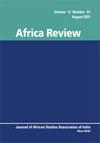博茨瓦纳人力资源开发可持续筹资
IF 0.5
Q4 AREA STUDIES
引用次数: 0
摘要
人力资源开发是实现经济增长和发展等宏观经济成果的关键。在发展不足的撒哈拉以南非洲(SSA)尤其如此。此外,人力资源开发对于成功履行《2030年议程》等国际承诺和国家愿景等愿望至关重要。在SSA国家,主要由于2007年后和2019冠状病毒病财政紧缩导致人力资源开发需求增加,职前人力资源开发的公共融资存在问题。本文的目的是测试这种情况在博茨瓦纳的适用性。本文以解释性研究哲学为基础,采用定性案例研究方法。这是一个使用辅助数据源的桌面研究。它的结论是,博茨瓦纳的情况反映了南南非的情况。最后,从这个案例得出的一般教训是,分区域需要可持续的人力资源开发筹资。本文章由计算机程序翻译,如有差异,请以英文原文为准。
Sustainable Financing for Human Resource Development in Botswana
Human Resource Development (HRD) is key for the achievement of macroeconomic outcomes such as economic growth and development. This is particularly true in development-deficient sub-Saharan Africa (SSA). In addition, HRD is vital for the successful delivery of international commitments such as Agenda 2030 and aspirations such as national visions. In SSA countries, largely due to increased demand for HRD in the face of post-2007 and Covid-19 fiscal strictures, the public financing of pre-service HRD is problematic. The purpose of the paper is to test the applicability of this situation in Botswana. The paper, rooted in interpretive research philosophy, adopted the qualitative case study approach. This was a desktop study that used secondary data sources. It concluded that the Botswana case mirrors the SSA situation. Concluding, the general lesson ensuing from this case is that there is a need for sustainable HRD financing in the sub-region.
求助全文
通过发布文献求助,成功后即可免费获取论文全文。
去求助
来源期刊

Africa Review
AREA STUDIES-
CiteScore
1.80
自引率
12.50%
发文量
22
期刊介绍:
Africa Review is an interdisciplinary academic journal of the African Studies Association of India (ASA India) and focuses on theoretical, historical, literary and developmental enquiries related to African affairs. The central aim of the journal is to promote a scholarly understanding of developments and change in Africa, publishing both original scholarship on developments in individual countries as well as comparative analyses examining the wider region. The journal serves the full spectrum of social science disciplinary communities, including anthropology, archaeology, history, law, sociology, demography, development studies, economics, education, gender studies, industrial relations, literature, politics and urban studies.
 求助内容:
求助内容: 应助结果提醒方式:
应助结果提醒方式:


